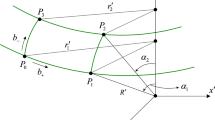Abstract
EINSTEIN'S prediction of a shift of the Fraunhofer lines to the red can be analysed into two assertions:— (1) That the period of vibration of an atom at rest on the sun differs from that of a similar terrestrial atom; and (2) that this difference is preserved unchanged by the light-waves travelling from the solar atom to the earth, so that it is revealed by a comparison made in a terrestrial laboratory. It is the second assertion that is challenged by Mr. Rice; and, so far as I can make out, the same objection was at the root of the criticisms formerly made by Sir Joseph Larmor. Since criticism centres entirely round the second assertion, I will deal with it solely. I may state, however, that although I regard the first assertion as highly probable, I do not regard it as proved with complete rigour; and had the criticism been directed against this, I should have been much less willing to take sides in the controversy.
This is a preview of subscription content, access via your institution
Access options
Subscribe to this journal
Receive 51 print issues and online access
$199.00 per year
only $3.90 per issue
Buy this article
- Purchase on Springer Link
- Instant access to full article PDF
Prices may be subject to local taxes which are calculated during checkout
Similar content being viewed by others
Rights and permissions
About this article
Cite this article
EDDINCTON, A. The Predicted Shift of the Fraunhofer Lines. Nature 104, 598–599 (1920). https://doi.org/10.1038/104598b0
Issue Date:
DOI: https://doi.org/10.1038/104598b0
Comments
By submitting a comment you agree to abide by our Terms and Community Guidelines. If you find something abusive or that does not comply with our terms or guidelines please flag it as inappropriate.


